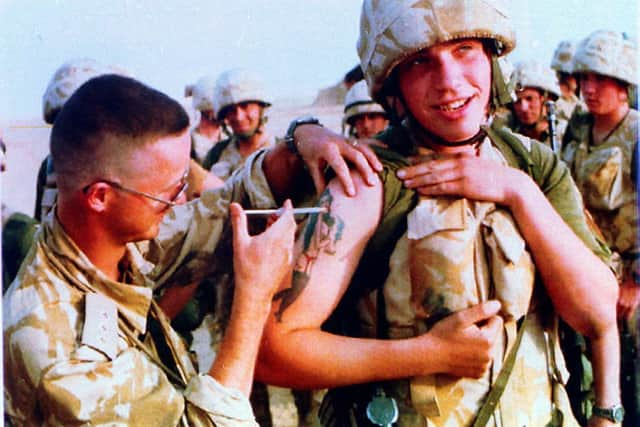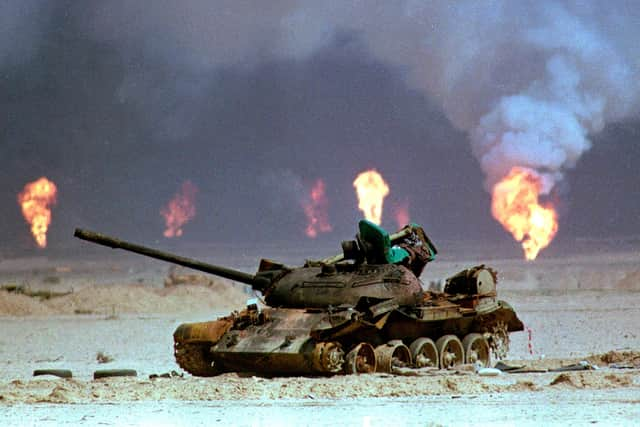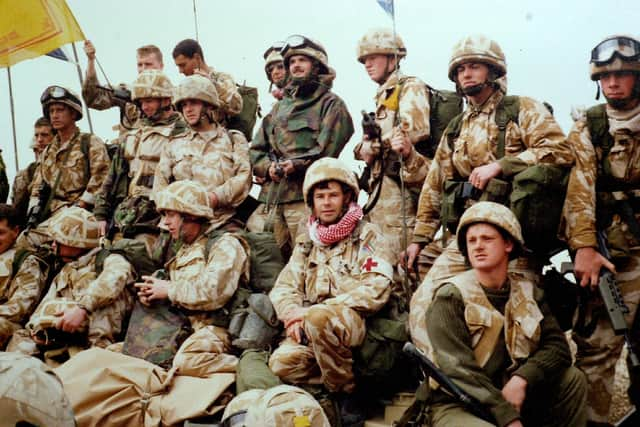Gulf War syndrome 'not caused by depleted uranium' Portsmouth scientists claim
and live on Freeview channel 276
Instead, academics believe the symptoms suffered by service personnel since the conflict in 1991 might have been caused by exposure to sarin nerve agent released widely when troops destroyed caches of Iraqi chemical weapons.
The illness, which has been suffered by thousands of personnel from the armed forces of the UK, US and other allied nations, has caused a range of acute and chronic symptoms.
Advertisement
Hide AdAdvertisement
Hide AdThese include fatigue, headaches, joint pain, indigestion, insomnia, dizziness, respiratory disorders and memory problems, and scientists believe it appears rooted in neurological impairment.


Researchers from the University of Portsmouth tested sufferers to examine levels of residual depleted uranium in their bodies and they say their study ‘conclusively proves’ that none of them were exposed to any significant amounts of depleted uranium.
The testing took into account the predicted decline in depleted uranium from normal metabolism over the time since potential exposure and testing, by using a highly sensitive method of testing in conjunction with metabolic modelling.
Professor Randall Parrish said: ‘For decades, medics and scientists have been looking for the elusive cause of Gulf War illness.


Advertisement
Hide AdAdvertisement
Hide Ad‘That depleted uranium is not and never was in the bodies of those who are ill at sufficient quantities to cause disease will surprise many, including sufferers who have, for 30 years, suspected depleted uranium may have contributed to their illness.’
Prof Parrish said the most likely remaining causes for the illness are low-level and widespread exposure to sarin nerve agent released widely from the destruction of Iraqi chemical weapons caches in January 1991, possibly compounded by the use of organophosphate anti-nerve agent medication and the liberal use of pesticides to prevent malaria exposure to allied forces.
The professor said the ‘plausibility of the link between depleted uranium’ and the syndrome had ‘bubbled along’ for almost 30 years and insisted it was ‘time to look elsewhere’.
Prof Parrish developed a method of detecting depleted uranium in urine from an exposure many years earlier and tested 154 well-monitored US Gulf War veterans who have the illness.


Advertisement
Hide AdAdvertisement
Hide AdNot a single trace of depleted uranium was found in any of the samples following testing which is 10 times more sensitive than previous procedures.
‘Being able to debunk the alleged connection between this illness and this radioactive substance allows the medical community to focus more clearly on what the likely cause(s) actually are,’ Prof Parrish added.
‘Finding causes is a nebulous game when you have so many options to blame. The allies’ own activities destroying an Iraqi nerve agent cache or spraying pesticides liberally on troops could be seen in hindsight as an inadvertent “own goal” and one to be avoided in future conflicts.’


The Royal British Legion said up to 33,000 UK Gulf War veterans could be living with the syndrome, with 1,300 claiming a war pension for conditions connected to their service in the Gulf.
Advertisement
Hide AdAdvertisement
Hide AdThe Ministry of Defence said it was ‘indebted’ to all Gulf war veterans and said it would ‘continue to monitor any Gulf War research’.
A message from the Editor, Mark Waldron
The News is more reliant than ever on you taking out a digital subscription to support our journalism.
You can subscribe here for unlimited access to Portsmouth news online - as well as our new Puzzles section.
Comment Guidelines
National World encourages reader discussion on our stories. User feedback, insights and back-and-forth exchanges add a rich layer of context to reporting. Please review our Community Guidelines before commenting.